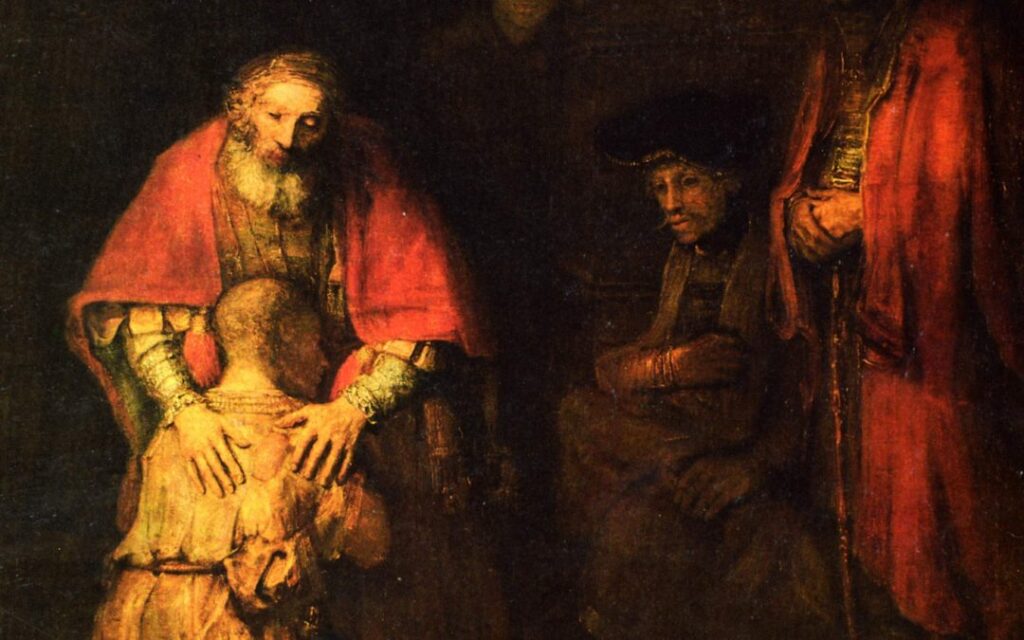“The Return of the Prodigal Son” by Rembrandt is one of my favorite paintings. Rembrandt was deeply moved by the Biblical story of The Prodigal Son, and this particular painting marked one of the artist’s final works, created in 1669. I came to know this work of art by way of Fr. Henri Nouwen, a Dutch-born priest and psychologist with a distinguished career as a teacher of pastoral theology at Harvard and Yale Divinity schools.
In 1986, Nouwen, emotionally affected by Rembrandt’s painting, made a heartfelt request to the State Hermitage Museum to spend hours alone in contemplation before the masterpiece. During this solitary communion, he meditated on the roles of the father and the son in the parable, drawing parallels to Rembrandt’s own life journey. This introspective experience culminated in Nouwen’s work, “The Return of the Prodigal Son: A Story of Homecoming.” This book is a poignant exploration for anyone who has ever asked themselves, “Where has my struggle led me?” Its themes are universal – homecoming, affirmation, and reconciliation. It speaks to all of us who have grappled with loneliness, despondency, jealousy, or anger.
Henri Nouwen’s own life journey took a transformative turn when he left academia to become the pastor of L’Arche Daybreak, a community dedicated to people with intellectual disabilities. During his time at L’Arche, Nouwen discovered something profound – he realized that the brightest and most beautiful souls he had encountered were not in the hallowed halls of Harvard or Yale, but within the L’Arche community itself. While there, Nouwen authored a book titled “Adam” that recounts his experiences with a disabled adult whom he cared for. This work delves into the profound lessons Nouwen learned from Adam, thereby setting the stage for my own personal journey as the mother of with a child with disabilities.
As I read Nouwen’s “The Return of the Prodigal Son,” I was struck by the author’s keen insight that, in the painting, one of the father’s hands on his son’s shoulders appears to embody feminine qualities, while the other displays masculine qualities. Nouwen’s journey from the academic world to the embrace of the L’Arche community exemplifies the transformative power of compassion and the profound impact of selfless love on our lives. At times we are the obedient child, at other times the runaway child, and other times the father/mother/caregiver, and there are times; especially when older, we become the “Papa” – the primary caregiver – of the family. At various times in our lives the roles can change and we must embrace this change as well.
The Role of the Cared For
Nouwen’s relationship with Adam taught him that the cared-for often have a unique gift to offer their caregivers. People with disabilities, like Adam, can reveal aspects of human vulnerability, resilience, and unconditional love that are transformative for those around them. They challenge our preconceived notions and societal norms, urging us to see beyond physical or intellectual differences.
The Role of the Caregiver
As caregivers, we often start with the noble intention of providing support and care. However, Nouwen’s journey reminds us that our motives can be clouded by our need for affirmation and recognition. Over time, he realized that true caregiving involves self-emptying love, devoid of any desire for validation. Caregivers must learn to let go of their ego, much like the father in the parable, and embrace a spirit of compassionate service.
The Ever-Changing Roles
Nouwen’s experiences with Adam taught him that our roles as caregivers and the cared for are not fixed; they can evolve throughout our lives. At times, we may find ourselves in need of care, and at others, we may be called to provide it. Recognizing this fluidity allows us to approach caregiving with greater humility and empathy.
“The Return of the Prodigal Son” invites us to reflect deeply on our roles as caregivers and the cared for, especially in the context of caring for people with disabilities. It reminds us that genuine caregiving is a journey of self-discovery and transformation. Through his experiences with Adam, Nouwen learned that true caregiving is not about seeking recognition but about both self-love and compassionate service. Ultimately, Nouwen’s work, like Rembrandt’s painting, reminds us of the profound lesson that love, forgiveness, and acceptance are at the heart of our relationships with others, and especially with those who may be differently abled.
